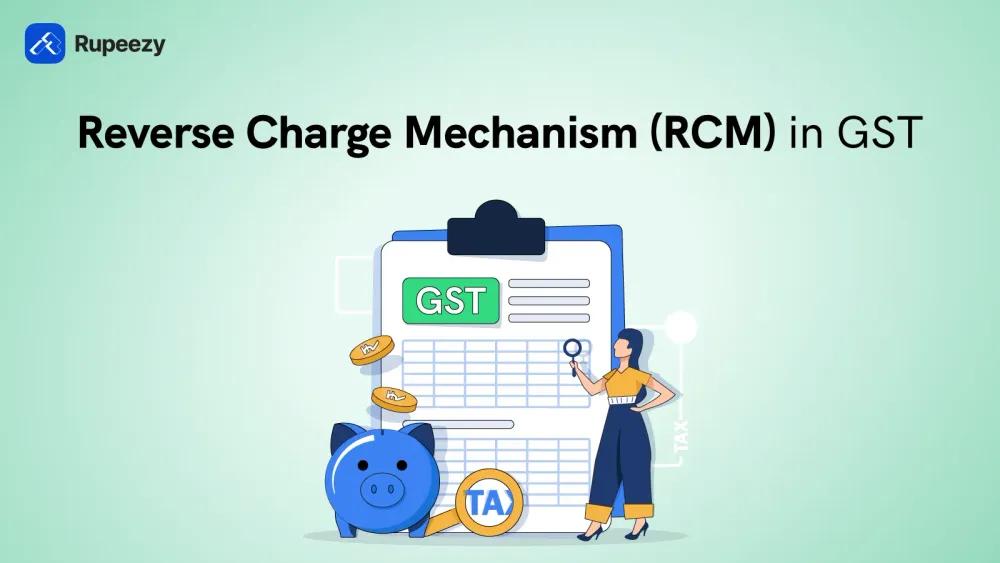RCM in GST: Meaning, Importance, ITC and Time of Supply


00:00 / 00:00
As we all know GST is an indirect tax that is paid to the government for the supply of goods and services in the country. As per GST policy, the supplier collects the tax from the end user and pays the tax amount to the government, but here under the reverse charge mechanism, it is the receiver who is liable to pay the taxes.
To find out more about how the reverse charge mechanism in GST (RCM) works you can continue reading the article, where we discuss the topic in detail regarding their importance, specific products and services under the reverse charge mechanism and many more.
What is RCM in GST?
Under the Goods and Services Tax (GST) regime, a reverse charge mechanism (RCM) is one in which the recipient of goods or services becomes liable to pay tax, rather than the supplier. Normally, the supplier collects and remits GST tax funds to the government. However, under this mechanism, the recipient must remit the GST directly to the concerned authorities. This is done in cases where there are unregistered suppliers or those with special kinds of supplies that require unique tax treatment.
Why is RCM in GST Important?
RCM plays a critical role in the GST framework for several reasons:
Broadening the Tax Base: RCM ensures that GST is collected even from transactions involving unregistered suppliers. This is crucial in sectors with a high volume of transactions involving small or unregistered entities.
Minimizing Tax Evasion: By shifting the responsibility of tax payment to the recipient, especially in cases where the supplier is unregistered with GST, RCM minimizes the risk of tax evasion.
Promoting Compliance: RCM encourages businesses to engage with registered suppliers to avoid the additional compliance burden of paying tax under RCM. This indirectly promotes the registration and formalisation of companies.
When is RCM in GST Applicable?
RCM is applicable under specific conditions defined by the GST law. They include:
Notified Goods and Services: There are certain categories of goods and services that the government notifies to be subjected to RCM. In such situations, tax must be paid by the recipient regardless of whether or not the supplier is registered.
Supply by an Unregistered Person to a Registered Person: If an unregistered supplier sells products or provides services to a registered person, it is the responsibility of the latter to remit GST under the reverse charge mechanism (RCM).
Import of Services: Under the Reverse Charge Mechanism (RCM), when services are brought in from a supplier based outside India, the recipient in India must pay Goods and Services Tax (GST). This ensures that services from outside the country also get covered under the Goods and Services Tax.
Who Should Pay GST Under RCM?
The liability to pay GST under RCM falls on the recipient of the goods or services. This applies in the following scenarios:
Registered Business Entities: Goods and services received by registered business entities from unregistered suppliers are liable to pay the GST under RCM.
E-Commerce Services: In the case of e-commerce services, the recipient of the services is responsible for paying the GST.
Specific Services: Some services are explicitly mentioned in RCM provisions, such as:
a) Goods Transport Agency
b) Recovery Agent
c) Director of a company or body corporate
d) An Individual advocate or firm of advocates
e) An Insurance Agent
List of Goods Supplied Under the RCM in GST
Here is the list of goods under RCM in GST:
SL. number | Product Description | Supplier | Recipient |
1 | Bidi wrapper | Agriculturist | Any Registered Person |
2 | Cashew Nuts | Agriculturist | Any Registered Person |
3 | Tobacco Leaves | Agriculturist | Any Registered Person |
4 | Supply of Lottery | State Government, Union Territory or any local authority | Lottery distributor or selling agent |
5 | Silk Yarn | A person who manufactures silk yarn. | Any Registered Person |
6 | Priority Sector Lending Certificate | Any Registered Person | Any Registered Person |
7 | Raw Cotton | Agriculturist | Any Registered Person |
8 | Used vehicles, seized & Confiscated goods | Central Govt or State Govt. Union Territory or the Local Authority | Any Registered Person |
List of Services under the RCM under GST
Here is the list of services under RCM in GST:
SL. Number | Provider | Recipient |
1 | Director of a company or a body corporate | Company or the body of corporate |
2 | Recovery Agent | Banking Companies, NBFCs or financial institutions |
3 | Goods transport agency | Casual Taxable person, body corporate, partnership firm, any society, factory, and persons registered under CGST, SGST, IGST Act |
4 | An insurance agent | Persons carrying on insurance business |
5 | Individual advocate or firm of advocates | Any business entity |
Read our latest blogs “IGST”, “How to Save Tax” and “Income Tax Slab” to learn more about the tax and GST!
Time of Supply under RCM in GST
What is the Time of Supply?
The time of supply under the RCM in GST relates to when the tax liability is created specifically. This is important for compliance because it will show when the tax must be accounted by the taxpayer which is the recipient of goods or services.
A. Time of Supply for Goods In GST
The time of supply for goods under RCM is the earliest of the:
Date of Receipt of Goods.
Date of Payment.
30 Days After Invoice Date: The date immediately after 30 days from the invoice date issued by the supplier.
If none of these can be determined, then the date of entry in the recipient’s books is used.
B. Time of Supply for Services in GST
The time of supply for services under RCM is the earliest of the:
Date of Payment.
60 Days After Invoice Date:
The date is immediately after 60 days from the invoice date issued by an unregistered supplier.
Date of Issue of Invoice by Recipient.
Registration Requirements
Section 24 of the CGST Act of 2017 states that businesses required to pay GST under the reverse charge mechanism (RCM) must register for GST, regardless of their total revenue.
Generally, there is a threshold limit of Rs. 20 lakh or Rs. 40 lakh which determines the requirement for GST registration. But in the case of RCM, the necessary party must compulsorily register themselves even if they fall below the threshold category.
Input Tax Credit (ITC) Under RCM
Under the Reverse Charge mechanism (RCM), the Input Tax Credit (ITC) permits the recipient of goods or services to claim a refund for the GST paid under RCM. This reduces the total tax liability since this ITC can be utilized in settling future tax payments. Nevertheless, ITC on RCM amounts can only be claimed if the goods or services are employed for business purposes.
Self Invoicing Under RCM
In GST, self-invoicing is when recipients of goods or services issue invoices for themselves on behalf of suppliers, under the Reverse Charge Mechanism (RCM). This happens usually when the supply is by an unregistered person or has to do with cases where no GST-compliant invoice is to be issued. The tax liability in such situations falls on the recipient who thus has to generate a self-invoice to document the transaction and fulfill the tax obligations under RCM.
Conclusion
The RCM in GST is a significant component of the compliance of tax, primarily in the case of transactions with unregistered suppliers or certain notified goods and services. RCM helps in widening the tax base, reducing tax flights and formalisation of business by transferring the tax responsibility from supplier to receiver. Under RCM, recipients pay GSTs, issue self-invoices wherever necessary to avoid penalties. Although there is an extra responsibility placed on the recipient under RCM, it enables them to claim an Input Tax Credit (ITC) on tax paid where goods or services are used for business purposes. Overall, RCM is one of the major elements of the GST framework which promotes transparency and accountability within a tax system.
For more such interesting articles, visit Rupeezy’s blog and gain valuable insights with us.
The content on this blog is for educational purposes only and should not be considered investment advice. While we strive for accuracy, some information may contain errors or delays in updates.
Mentions of stocks or investment products are solely for informational purposes and do not constitute recommendations. Investors should conduct their own research before making any decisions.
Investing in financial markets are subject to market risks, and past performance does not guarantee future results. It is advisable to consult a qualified financial professional, review official documents, and verify information independently before making investment decisions.

All Category










